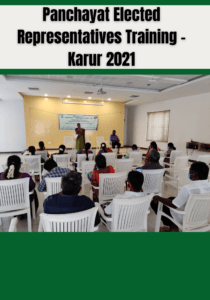Towards Building a National Campaign for Constitutional Amendment to Part IX & IX-A (Article 243 G & W) and Amendment to Create List IV in the Seventh Schedule (Local Government List)
National Consultation for Strengthening Local Government
and Dalit and Women Elected Representatives
11th March 2014 – New Delhi
 National Consultation for Strengthening Local Government and Dalit and Women Elected Representatives was held on 11th March 2014 – New Delhi With representative heads of civil society organisations and Panchayat leaders.
National Consultation for Strengthening Local Government and Dalit and Women Elected Representatives was held on 11th March 2014 – New Delhi With representative heads of civil society organisations and Panchayat leaders.
Ms.Devaki Jain, Development Economist & Activist inaugurated the consultation and consented to be part of this campaign. Mr. George Mathew, Chairman of Institute of Social Sciences who has organised several national consultations of panchayat presidents, delivered the key note address and extended his solidarity to this campaign.
Ossie Fernandes, Director, HRF chaired the inaugural session said that this a beginning of long journey to build a campaign for dalits, Adivasis and women as there is more bureaucratization rather democratization and decentralisation in panchayat governance. Mr.Ramesh Nathan, National Convenor, National Dalit Movement for Justice, welcomed the participants and said that a National level vibrant campaign is necessary to advocate with Central Government to bring the amendments in 73rd Constitutional Amendments.
Ms. Sehjo Singh, Director, Programmes & Policy, Action Aid India, shared her valuable experiences especially on Women Panchayat Presidents. Around 40 delegates across various states of India participated. They also discussed the issues of Panchayat in their respective States especially difficulties caused by non-devolution of powers, finance, discrimination of Women and Dalit representatives, etc.,
The main purpose of the consultation was to initiate a National Campaign for Constitutional Amendment to Part IX & IX-A (Article 243G & W) and Amendment to create List IV in the Seventh Schedule (Local Government List). Members of the campaigns are now informed of the necessity of inclusion of List IV in Seventh Schedule of the Constitution and Amendment to Part-IX and IXA of the Constitution in order to strengthen the Local Government.
It was decided to form a coalition and to broaden the campaign by including various stakeholders like Village Panchayat presidents, civil society organisations, women and dalit movements across the state. Seeing the significance of this programme National Dalit Movement for Justice based at Delhi decided to co organize together with several networks namely Dalit Arthik Adhikar Andolan, All India Dalit Mahila Adhikar Manch, National Campaign for Dalit Human Rights, Institute of Social Sciences, Human Rights Advocacy and Research Foundation, Tamil Nadu NGO Alliance for Empowering Panchayat Government.

Around 40 delegates across various states of India Including Mr. Abdul Gani Khan and two others from Jammu & Kashmir, who are also part of Association of Local Governance of India, Ms.Asha Devi, Zilla Panchayat representative from Rajasthan, Mr.Sukhdev Vishwa Premi, Director, Centre for Mountain Dalit Rights, Himachal Pradesh, 2 representatives from National Campaign for People’s Right to Information, representatives from Dalit Adhikar Manch, Bihar, 12 participants including 3 village Panchayat presidents from Tamil Nadu participated.
The key decisions evolved are
- Circulate widely the draft amendments together with a Position Note
- Organise a larger convention inviting village panchayat presidents across the state and civil society organisations, women and dalit movements, etc. in June or July 2014.
- Circulate a one page manifesto to all the political parties before the parliament election.
RESOLUTIONS AND WAY FORWARD
- Mandatory devolution of powers, finances and personnel to the Panchayat and Municipality by amending Article 243 G & W of constitution.
- The Amendments stops short of ensuring the devolution of powers to Panchayat government institutions similar to the List-I, II & III for Union List, State List, and Concurrent List respectively. There is no list IV for Local Government. The devolution of 29 powers outlined in the 73rd Amendment and 18 powers in the 74th Amendment has not been made mandatory by way of amendment to the Panchayat Act and Constitution. Hence it is also necessary to devolve 29 powers to Panchayat and 18 powers to the municipality by way of amendment to the respective Panchayat Act and Constitution. Devolve greater functions, funds and functionaries to the Panchayat so that they have effective political authority and discharge their duties and functions as local institutions of self-government within the meaning contemplated by the Indian Constitution. This includes lessening bureaucratic control over Panchayat programmes and making bureaucrats more accountable to the Panchayat, especially as regards abiding by Panchayat decisions.
- Give the gram sabhas greater powers to monitor the functioning of the Panchayat and decide on budgets and the allocation of funds and other resources, as well as the identification of beneficiaries for Panchayat schemes. Village development plans should be formulated by the gram sabhas, which would then feed into development plans at the taluk /union and district levels. Information on gram Sabha meeting agendas must be publicly shared in advance.
- Establish separate quorums for participation by Dalits and women in gram sabhas and sub-gram sabhas (i.e. ward sabhas).
- Removal of arbitrary powers of District Collector. Remove the discretionary powers of the District Collectors to remove Panchayat presidents.
Finally an ad-hoc committee\team consist of Ossie Fernandes, Ramesh Nathan, Sukhdev Vishwa Premi, Satish CDR, Gandhimathi, A.G. Khan and Mr. George Mathew, Ms. Devaki Jain, Ms. Aruna Roy and Nikil Dey as experts is formed for drafting the position paper with data in support of Amendments.
For full Report contact HRF.





